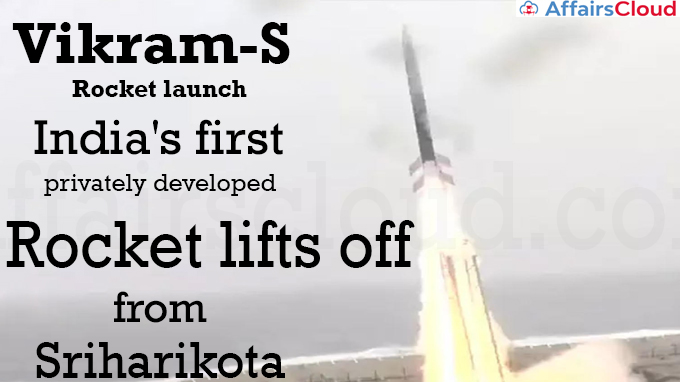 The Indian Space Research Organisation (ISRO) launched India’s first privately built rocket – ‘Vikram-S’ (VKS), a suborbital launch vehicle, from the Satish Dhawan Space Centre in Sriharikota, Andhra Pradesh.
The Indian Space Research Organisation (ISRO) launched India’s first privately built rocket – ‘Vikram-S’ (VKS), a suborbital launch vehicle, from the Satish Dhawan Space Centre in Sriharikota, Andhra Pradesh.
- The rocket “Vikram-S,” the first in the Vikram series, is named after Vikram Sarabhai, widely regarded as the pioneer of India’s space program.
- It is being developed under the mission “Mission Prarambh” (the beginning), which represents a new beginning.
Skyroot Aerospace, a startup based in Hyderabad (Telangana), developed the Vikram-S rocket and the Prarambh mission with assistance from ISRO and the Indian National Space Promotion and Authorization Center (IN-SPACe).
Significance
- The mission’s aim is to launch Vikram-S, a single-stage, solid-fueled suborbital rocket, into space, and the mission was approved by IN-SPACe.
- After the Central Government opened the space sector to private operators in 2020, Skyroot Aerospace became the first privately held company in India.
Highlights of ‘Vikram-S’ Rocket & Prarambh Mission
i.”Vikram-S” is one of the world’s first all-composite rockets with 3-D printed solid thrusters for spin stability of the launch vehicle.
- According to Skyroot Aerospace, the Vikram-S is the quickest and most affordable voyage to space.
- It has a body mass of 545 kg, a length of 6 metres, and a diameter of 0.375 metres.
ii.The Prarambh mission carried 3 client payloads, two Indian and one foreign, equipped with sensors for measuring acceleration and pressure.
- The 3 satellites are from Chennai (Tamil Nadu)-based SpaceKidz, Andhra Pradesh-based N-SpaceTech, and Armenia’s BazoomQ Space Research Lab.
- The payloads will be positioned in a 500 km low inclination orbit (LIO) by the Vikram-S launch vehicle.
iii.The rocket’s launch is anticipated to demonstrate the flight-testing of Vikram series avionics systems such as telemetry, tracking, inertial measurement, the Global Positioning System (GPS), an on-board camera, data acquisition, and power systems.
iv.Vikram-S will be powered by India’s first carbon-fibre-built solid fuel engine, which has been approved for launch by IN-SPACE.
v.The Vikram-S rocket is a scaled-down variant of the Vikram-1 rocket.
- Vikram-S is a single-stage rocket, whereas Vikram-1 is a multi-stage vehicle.
vi.Skyroot Aerospace will have 3 rocket variants:
- Vikram I – payload or carrying capacity: 480 kg to 500 km in low inclination orbit (LIO); 290 kg to 500 km in sun-synchronous and polar orbit (SSPO)
- Vikram II – 595 kg to 500 km LIO, 400 kg to 500 km SSPO
- Vikram III – 815 kg to 500 km LIO, 560 kg to 500 km SSPO
Skyroot Aerospace
i.Skyroot Aerospace was established in June 2018 by former ISRO scientists Pawan Kumar Chandana and Naga Bharath Daka.
ii.It is India’s largest privately funded space start-up, with Rs. 526 crore in capital raised to date, and has won national awards twice.
iii.It is the first startup to sign a Memorandum of Understanding (MoU) with the ISRO.
iv.Skyroot has successfully built and tested India’s first privately developed cryogenic, hypergolic-liquid, and solid fuel-based rocket engines using modern composite and 3D-printing technologies.
Recent Related News:
Dr A K Anil Kumar, Senior Scientist in Indian Space Research Organisation (ISRO), was elected as the Vice- President (VP) of the International Astronautical Federation (IAF) during Annual Conference International Astronautical Congress (IAC) 2022 held in Paris (France) on 18-22 September 2022.
About the Indian Space Research Organisation (ISRO):
Chairman – S. Somanath
Headquarters – Bengaluru, Karnataka
Established – 1969




